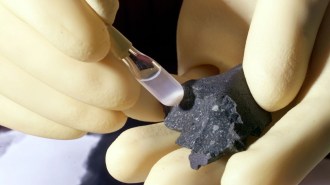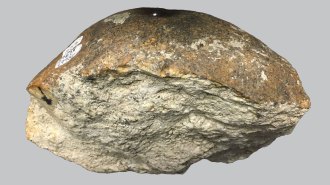Uncategorized
-
 Space
SpaceHere are 10 of Arecibo’s coolest achievements
The now-defunct Arecibo radio telescope in Puerto Rico made myriad discoveries over its 57-year run, including of pulsar planets and ice on Mercury.
-
 Space
SpaceWhy losing Arecibo is a big deal for astronomy
The radio telescope at the Arecibo Observatory has collapsed, robbing scientists of a special tool for studying everything from asteroids to galaxies.
-
 Planetary Science
Planetary Science50 years ago, scientists caught their first glimpse of amino acids from outer space
In 1970, scientists detected amino acids in a meteorite. Fifty years later, a variety of chemical ingredients for life have been found in other space rocks.
-
 Archaeology
ArchaeologyTwo stones fuel debate over when America’s first settlers arrived
Stones possibly used to break mastodon bones 130,000 years ago in what is now California get fresh scrutiny.
By Bruce Bower -
 Quantum Physics
Quantum PhysicsThe new light-based quantum computer Jiuzhang has achieved quantum supremacy
A second type of quantum computer has now performed a calculation impossible for a traditional computer.
-
 Humans
HumansAncient humans may have deliberately voyaged to Japan’s Ryukyu Islands
Satellite-tracked buoys suggest that long ago, a remote Japanese archipelago was reached by explorers on purpose, not accidentally.
-
 Health & Medicine
Health & MedicineThe ‘last mile’ for COVID-19 vaccines could be the biggest challenge yet
The need for cold storage and booster shots could create problems for distributing coronavirus vaccines to nearly everyone in the world.
-
 Health & Medicine
Health & MedicineThe U.K. is the first country to authorize a fully tested COVID-19 vaccine
Pfizer will deliver the first of 40 million doses of its coronavirus vaccine promised to the United Kingdom in the coming days.
-
 Science & Society
Science & SocietyA COVID-19 time capsule captures pandemic moments for future researchers
Social scientists chose photos, charts and even a tweet to help future researchers understand the pandemic.
By Sujata Gupta -
 Space
SpaceDecember’s stunning Geminid meteor shower is born from a humble asteroid
Most meteor showers arise from comets, but the robust Geminid shower comes from an asteroid, Phaethon, which scientists are still trying to figure out.
By Ken Croswell -
 Health & Medicine
Health & MedicineHealth care workers and long-term care residents should get COVID-19 vaccines first
With an initial 40 million doses of the vaccines, enough for 20 million people, anticipated by year-end, health officials are setting priorities.
-
 Planetary Science
Planetary ScienceChina is about to collect the first moon rocks since the 1970s
The robotic Chang’e-5 mission, which landed on an unexplored region of the moon December 1, aims to gather samples and return them to Earth.